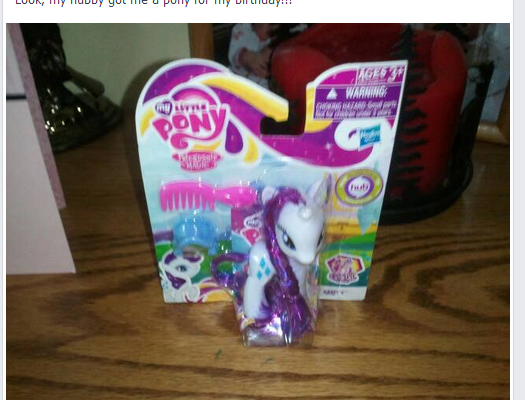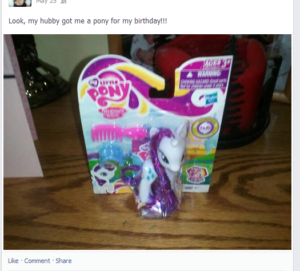Am I the only one who just noticed that it’s Wednesday? The holiday week with the free day is completely screwing me up.
Just to make this a relevant post:
Spend less!
Save more!
Invest!
Wee!
The no-pants guide to spending, saving, and thriving in the real world.

For the past couple of years, my daughters have been riding in horse shows with a local saddle club. We’ve been lucky in that my wife’s cousin has let us borrow her horse for the shows, so costs have been minimal.
Unfortunately, that horse isn’t available this year. We knew that a few months ago, so the plan was to take a year off from the shows and focus on lessons, to get the girls some real skills. We found a great instructor at a stable about 30 miles from our house. Since we live less than two miles from the border of the biggest city in the state, that’s a comparatively short drive.
We pay her $200 per month for 1 lesson per week for both girls. They each get 30-45 minutes on the horse during each lesson.
Now that show season has started, the plan seems to have changed. The girls will be riding a different borrowed pony tomorrow. The shows cost about $50 for registration, lunch, and gas. Our club has 1 show per month, but my wife has assured me they’ll only be hitting three shows this season and limiting the number of events to keep the cost down.
The direct costs aren’t too bad, but there’s a problem with keeping-up-with-the-Joneses accessorizing. Vests and boots and helmets and belts and shirts, oh my.
I’d guess our costs for the summer will be $300 per month.
One thing we’ve been considering is buying a pony. We can get an older pony for around $500-1000. Older is good because they are calmer and slower. Boarding the thing will cost another $200 per month. We’ve been slowly accumulating the stuff to own a horse, so I’m guessing the “OMG, he let me buy a horse, now I need X” shopping bill will come to around $1500, but I’ll figure $2000 to be safe. We already have a trailer, a saddle, blankets, buddy-straps, combs, brushes, buckets, rakes, shovels, and I-bought-this-but-I-will-just-put-it-in-the-pile-of-horse-stuff-so-Jason-will-never-notice stuff. We’re certainly close to being ready to buy.
(FYI: If you’re starting from scratch, don’t think you’re going to get into horse ownership for less than $10,000 the first year, and that’s being a very efficient price-shopper.)
So we’re looking at $5400 for a horse, gear, and boarding the first year. If we cancel the lessons, by spring we’d have $2000 of that saved and most of the rest can be bought over time.
On the other hand, if we go that route, we’ll never save enough to buy the hobby farm we’re looking for.
Decisions, decisions. I should just buy a new motorcycle. Within a year, I win financially.
 As I’m sure you’ve all heard by now, a young Mr. John Luke Robertson is engaged to be married at the ripe age of nineteen. While I’m positive you may be reeling in awe at how anyone could fathom being married at that age, the idea isn’t such a terrible one. The Robertsons have done more than build an outdoorsman’s empire; they’ve set the standard for wholesome values and American family dynamic. Even though I’m sure the two lovebirds won’t be dining on ramen and sharing a ramshackle apartment on the cheap side of town, they have the right idea. Let’s take a moment to explore why marrying young may not be such a bad idea for those of us less waterfowl adept.
As I’m sure you’ve all heard by now, a young Mr. John Luke Robertson is engaged to be married at the ripe age of nineteen. While I’m positive you may be reeling in awe at how anyone could fathom being married at that age, the idea isn’t such a terrible one. The Robertsons have done more than build an outdoorsman’s empire; they’ve set the standard for wholesome values and American family dynamic. Even though I’m sure the two lovebirds won’t be dining on ramen and sharing a ramshackle apartment on the cheap side of town, they have the right idea. Let’s take a moment to explore why marrying young may not be such a bad idea for those of us less waterfowl adept.
In the beginning, there was man. Man loved woman. Woman loved man. They found that they were so completely enamoured with one another that they couldn’t stand the idea of a moment apart and decided, “Hey, let’s spend every moment of or life together, forever.” There they are. Two young, ambitious people with the world ahead of them. Now what?
Likely, college is still looming for the two. Instead of struggling to work through school while paying for housing, they help each other. Two incomes mean half the burden and twice the savings. Instead of going out at night, they stay in studying, bonding, burning cookies and making lasting memories. After four years, that time spent at home has paid off. Instead of tarnishing their unblemished credit by applying for for small loans to stay afloat and likely defaulting, they’ve been paying off credit cards, paying on student loans, and thusly establishing good credit.
Speaking of homes, it’s about time for that. Thanks to the lack of partying and indecision, they left school with great GPA’s, promising careers, and a near perfect credit history. They purchase a home. Likely, a nice home with room to grow and most importantly, equity. Now that they’ve made the leap, the mortgage payment isn’t much more than the rent would have been and they can afford to pay a little extra toward the principle each month. Settling down so early has paid in dividends, via two incomes and ever increasing property value. Our couple has accomplished in five years what would take a single graduate closer to ten or fifteen to obtain.
They may or may not decide to have children. In the event that they do, the kids will have grown and left the nest before our couple has even reached 45. Diligently working and supporting each other, they have continued to save. The house is paid off and the kids are gone. Retired at 50, they own their home outright. They can relax and spend the rest of life enjoying it from a comfy porch swing. There is no struggle or financial burden. They are free, while others their age may still be living paycheck to paycheck and worrying about keeping a roof overhead.
You may still consider the idea of marrying young to be frivolous, but it is likely that at this point in your life you could have been twice as well off had you only settled down with that girl from high school who would have followed you to the end of the Earth. Following your heart may not only make you happy, it can make you stable, self sufficient and and financially secure. They don’t make a duck call for that.
I wrote this post was as a guest post a year ago, to answer the question, “What is the best financial advice or tool you have found or been given?”
Once upon a time, there was a young man–an arrogant man barely out of childhood–who thought he new more than anyone he had ever known, trusted, or respected. In his arrogance, he left his family and friends behind to enter the wilderness in search of a long lost teacher.
He found the teacher. He even managed to convince the teacher to accept him as his pupil.
However, he didn’t change his ways. He insolently ignored the fundamental lessons, assuming he already understood them. When he was rebuked by his teacher, his only defense was to whine that he was “trying”.
“Do or do not. There is no ‘try’,” replied Yoda.
These words of wisdom represent one of the most fundamental rules of personal finance, or even life, itself. If the best you have to offer is a half-hearted “try”, you will never succeed.
When my wife and I decided that it was time for our debt to die the death of a sad specter of self-loathing hiding in a cave, we went at it with a relish that would have launched a poor astromech droid to the freakin’ moon!
We never said we’d give it a shot for a month and see how it went. We knew that we either needed to succeed or we’d have to file bankruptcy. We didn’t try, we did it. Rather, we are doing it. Friends told us it was impossible to live without credit; that we were foolish to try. They were right, so we didn’t try.
Similarly, when it was time to get started on a college fund instead of hanging our hopes on scholarships, we just did it. Sure, we started the fund with just $10, and it is only growing by $10 per month, but it’s there and it’s growing. When we get our debt paid off, we’ll see exactly how close we can get to giving our kids a self-funded full ride to college.
When it comes time to get the things done that you know need to be done, the trick is to do it. Don’t make excuses. Don’t “try” to find time. Just make it happen. Cut up your credit cards, make your budget, or sell the stuff you don’t need. Whatever it is, do it.
There is no try. There is only DO!

When I was little, the world was amazing. The first snowfall was among the best days of the year. Everything was worth exploring, in hopes of discovering something new and fascinating, and everything was fascinating.
Stepping on a crack had serious implications. The wishbone in a turkey earned its name. Blowing out all of the candles on a birthday cake could change your life. The idea of some dude half a world away, watching you, then sneaking into your house to dish our rewards and punishments wasn’t pervy and sick, it was wonderful.
Then, one day, it all changes.
Somebody–a classmate, a older brother, a neighbor–let’s it slip that Santa isn’t real, and the implications snowball. That day, the magic dies.
Wishing on a star? Over.
The Easter Bunny? Hasenpfeffer.
Growing up to be Superman? Welcome to the rat race.
It’s a sad day when kids stop believing in magic.
I don’t believe in lying to my children, but I also don’t believe in destroying their magic. It’s a balancing act.
When my son was 6, an older boy at daycare tried to kill Santa for him. He was upset.
“Dad, is Santa real?”
“What do you think?”
“I don’t believe in Santa.”
“Okay, I’ll let him know.”
“Nonononononono! Don’t tell him!”
Was it lying? Probably, but he obviously wasn’t ready to stop believing, so I let him continue. A year later, we had the same conversation, but the results were quite different.
“Dad, you’ve always said that you hate lying, so why did you let me believe in Santa?”
So I told him the truth. Magic is a frail thing that’s nearly impossible to reclaim and I wanted him to have that treasure for as long as possible. And, “Now that you know, you are in on the conspiracy. You’ve been drafted. Don’t kill the magic for anyone else.”
It was weird having him help me stuff stockings.
If you’ve got kids(and celebrate Christmas), how do you handle the Santa problem?
It’s a sad day when kids stop believing in Santa Clause, the Tooth Fairy, and fairies.

Not because I enjoy lying to my kids, but because–on the day they stop believing–a piece of their innocence is lost. An unforgettable, valuable part of childhood dies.
Believing in magic is a beautiful thing.
Do you remember the last time you looked around the world with a sense of wonder? When seeing a puppy form in the clouds was a miracle? When the idea of an ant carrying 1000 times its own weight was something worth watching? When the impossible goodness of a fat man squeezing down your chimney fills you with hope instead of making you call 911?
Do I believe in Santa?
Of course not, but I believe the concept of Santa is worthy of my children’s belief. I don’t want them to lose that innocence and wonder.
When my teenager was young, he asked if Santa was real. I responded by asking what he thought. When he told me he didn’t believe, I offered to let Santa know. His panic told me he wasn’t ready to give up the magic.
The day that conversation didn’t cause a panic, he looked hurt, like he’d lost something precious. He had.
His world of magic was gone.
The he asked why I had spent his lifetime lying to him. I told him the truth. I said I couldn’t bear to be the one to shatter his belief in magic before he was ready.
Then, I informed him that he was in on the conspiracy. He was not allowed to ruin it for anyone else. Not his sisters, not his friends.
That Christmas, my little boy helped me stuff stockings, which was an odd feeling.
The magic was over, but we still got to share the magic of his cousins and sisters.